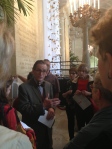Last weekend I attended the fourth annual Biographers International Organization (BIO) Annual Conference held in New York City. This year more than 225 biographers gathered at the Roosevelt Hotel to discuss research, writing, book reviews, social media, and a host of other topics.
I had the pleasure of moderating a panel entitled “Crafting Biography” featuring three biographers – Kate Buford, David Stewart, and Marc Leepson – who among them have written more than a dozen books. My favorite tidbit from this panel was from Marc Leepson. He does not sleep with a notebook by his side to capture all those brilliant late night ideas. Instead, he uses his phone to send himself e-mails about his words of wisdom. Why didn’t I think of that?
For those that lament the obstacles of finishing a book, feel sorry for yourselves no longer. Amanda Foreman, award-winning author of Georgiana: Duchess of Devonshire, managed to finish her second book, A World on Fire, with five children under five and a husband diagnosed with cancer. She regaled the audience with tales of how she accomplished this feat including how she had to return her original advance and find another publisher. I will never complain again.
The conference isn’t just about what you learn, but who you meet. On Friday, I took a research tour of several libraries with our guide, Nancy Goldstone. At the New York Public Library I learned about the Arthur Schlesinger, Jr. Papers, and have since found correspondence between him and the subject of my next book, Nicholas Katzenbach. One letter in particular provided me with a timeframe for a William Safire column I have tried to track down. I was off by about a decade, no wonder why I couldn’t find it?!?
Networking is another perk of BIO. At the conference I met fellow writer Steve Weinberg who is writing about Garry Trudeau. I did a slew of research about the evolution of Lacey Davenport, most of which I didn’t include in my book due to space constraints. Now, however, I plan to give the Lacey research to Weinberg so it can be put to good use. And for me, Weinberg offered to put me in touch with his father who was in the same POW camp, Stalag Luft III, as Nicholas Katzenbach during World War II. I’m always surprised by the bountiful serendipity that occurs at BIO.
I could go on and on about all the connections made, but I don’t want to bore the reader. So I’ll conclude where the conference ended, awarding the first Plutarch Award to Robert Caro for The Passage of Power, his fourth volume on President Lyndon Baines Johnson. Ironically, Caro was in Texas doing research for his next LBJ volume so one of his editors, Katherine Hourigan from Knopf, accepted the award on his behalf. Well-deserved.


